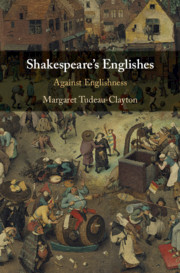Book contents
- Shakespeare’s Englishes
- Shakespeare’s Englishes
- Copyright page
- Epigraph
- Contents
- Table and Illustrations
- Acknowledgements
- Chapter 1 Introduction
- Chapter 2 Shakespeare and ‘the King’s English’
- Chapter 3 Shakespeare and ‘the true-born Englishman’
- Chapter 4 ‘they bring in straing rootes’
- Chapter 5 Figures and Parables of a ‘straing’ Word
- Bibliography
- Index
Chapter 1 - Introduction
Shakespeare and Cultural Reformation Ideology
Published online by Cambridge University Press: 07 October 2019
- Shakespeare’s Englishes
- Shakespeare’s Englishes
- Copyright page
- Epigraph
- Contents
- Table and Illustrations
- Acknowledgements
- Chapter 1 Introduction
- Chapter 2 Shakespeare and ‘the King’s English’
- Chapter 3 Shakespeare and ‘the true-born Englishman’
- Chapter 4 ‘they bring in straing rootes’
- Chapter 5 Figures and Parables of a ‘straing’ Word
- Bibliography
- Index
Summary
This chapter introduces the central claim by grounding it in a range of contexts, beginning with the use of the word ‘Englishes’ by John Florio in 1598. The first section discusses the post-reformation struggle over the ‘property’ of ‘our English’ in the sense of defining character and ownership, a struggle conducted around practices in theatre and translation. The phrase ‘our English’ features only once in the Shakespearean canon, in The Merry Wives of Windsor, where it is set against ‘the King’s English’. This opposition finds echo in staged confrontations, notably around Shakespearean instances of the word ‘reformation’. These anticipate future cultural history and critical responses to Shakespearean practice, beginning with Ben Jonson whose alignment with cultural reformation ideology is highlighted. The exclusionary character of this ideology is pointed out and Shakespearean resistance to it in plays of the 1590s introduced. Specifically, the welcoming of (linguistic and human) strangers urged by Shakespeare is discussed in relation to his status as ‘Englishman forren’, while his inclusive vision of ‘our English’ is considered in relation to the present as well as the past.
Keywords
- Type
- Chapter
- Information
- Shakespeare's EnglishesAgainst Englishness, pp. 1 - 45Publisher: Cambridge University PressPrint publication year: 2019

